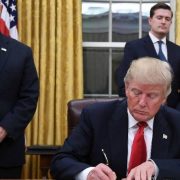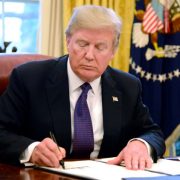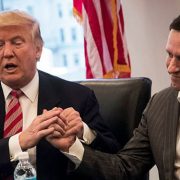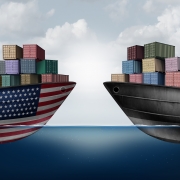There is a lot of ideological purity being bandied about recently in favor of “free trade”. It is spouted in righteous indignation on the subject of the Trump Administration’s recently announced intent to impose import tariffs on steel and aluminum imports. All of a sudden, the left-wing professoriate has discovered the virtues of free market economics. Or at least, they find an opportunity in virtue-signaling their opposition to Trump.
A Fine Theory.
Free trade is a theory. Historically, it was advanced by classical economists like David Ricardo and Adam Smith, who pointed out that schemes of tariffs and taxation and statutory import and export limitation were always aimed at furthering government aims and not at the betterment of the people who wanted to trade with their counterparts in foreign countries. In the never-ending battle between the entrepreneurs aiming to improve the quality of life of all economic citizens, and the government aiming to control the population and make sure no-one succeeded more than the government was prepared to allow, free trade became a loser.
Non-existent In Practice.
Today, there is no free trade. Zero. There is not a single trade that is not governed by legislation, bureaucratic rule making, taxes, tariffs or subsidies or political adjustments of some kind. No boat can sale, no plane can fly, no truck can deliver without political permission. Giant global bureaucracies like WTO, and regional ones like TPP and Nafta and the EU make sure that not a single transaction can be made without a specific permission within their rule making.
All of this political bureaucracy imposes costs of money and time delays. Entrepreneurs who want to import and export must research tariff and tax tables, employ their own compliance staff, file forms, undergo inspections, and submit reports about their activities, in addition to incorporating the actual taxes and tariffs into their costs, often acting as collectors for the government.
A Bureaucratic Tangle.
Why so much bureaucracy and cost? Not because of economics. From Ricardo and Smith, we know the economic benefits of free trade. The systemic strangulation of free exchange between countries is entirely driven by politicians. Politicians desire only two things: control over the free, imaginative and entrepreneurial activities of people, and a revenue stream that they can confiscate from the productive activities of others.
The result is a distorted and sclerotic tangle of unfree economic exchange, an unfathomable explosion of rules and regulations, a hampered global economy of constrained buyers and over-regulated sellers. The bureaucrats are happy because there are manifold opportunities for their enemies, the productive economic actors, to make mistakes, yielding unending opportunities for fines, penalties, “clarifications” (a bureaucratic favorite) and more rules.
A Small Bomb.
Along comes Trump and rolls a bomb into this building. A bomb is a vehicle for disruption. This particular bomb is a small one with limited explosive capacity. It could blow open a door, with the opportunity for some evil to exit or some good to enter. If a wall collapses, it opens up the chance of new and perhaps more open construction. If a beam falls, there might be the opportunity to eliminate entire stories of the twisted edifice.
Thinking Ahead.
Moreover, it is likely that Trump is better at systems thinking than the politicians and bureaucrats, for whom short termism is the dominant style. After he rolls in this bomb, will the EU or Canada or China retaliate? If so, that further exposes the façade of international co-operation and clearly underlines the bias of the system towards antagonism and confrontation. Such retaliation will open new pathways for Trump to renegotiate, expanding his options. What if the result is to start a meaningful discussion about how China illegally confiscates American companies’ intellectual property? Or about how Germany illegally favors BMW automobiles and Miele household appliances in its system of state-supported industries?
Tear Down This Trade Agreement.
Free trade is a perfectly viable theory, and it is nice to read about it in historical economics texts. We can all benefit from understanding the concept, because it helps us see how the politicians have permanently destroyed one of the purest mechanisms for collaborative human betterment. But don’t let’s tolerate screeching hypocritical distress over the use of a small explosive device to collapse the edifice of managed trade. It deserves to collapse.













